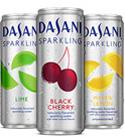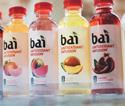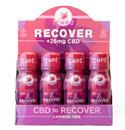Coca-Cola
Pressure To Cut Plastics Use Sways Coke Toward Aluminum Cans For Dasani

Under pressure to reduce plastic use in packaging, Coca-Cola Co. will start selling Dasani in aluminum cans in the U.S. Northeast next month, and in other parts of the country in 2020. PepsiCo Inc. said recently it would try selling its mainstream water brand Aquafina in cans at restaurants and stadiums. Aluminum cans generally contain more recycled material than plastic bottles and are less likely to float away in the ocean. Dasani and Aquafina are the top two bottled brands in the U.S., with combined sales north of $2 billion. Coke also plans to introduce a “hybrid” Dasani bottle, with half of the materials from a combination of plants and recycled plastic. [Image Credit: © The Coca-Cola Company]
After U.K. Success, Coke To Launch Cinnamon-Flavored Variant In The U.S.

Coca-Cola plans to launch a limited-time cinnamon-flavored version of its iconic namesake soda – either the zero sugar or full-sugar variety – in the U.S. at the end of September. The company was persuaded to launch stateside after cinnamon-flavored Coca-Cola Zero Sugar made a splash in the U.K. last year. Coke reportedly also plans to launch a Winter Spiced Cranberry variant of Sprite at the same time.[Image Credit: © The Coca-Cola Company]
Coca-Cola Amatil Agrees To Distribute Australian Firm’s Health Beverages
 Australia’s Coca-Cola Amatil has signed a distribution agreement with specialty beverage firm Made Group that will expand the reach of Made’s protein smoothie brand Rokeby Farms and cold-pressed juice brand Impressed Juices to more than 50,000 locations. The company said it has other plans in the works with Made Group that will come to fruition before the end of the year. It also plans to further expand the capacity of its chilled products distribution within the year. Both Coca-Cola Australia and Coca-Cola Amatil invested in Made Group last year, each acquiring a 45 percent minority interest. A Coca-Cola Amatil Group executive said Made Group was considered “an important link” in the Accelerated Australian Growth Plan for Coca-Cola Amatil and Coca-Cola Australia.[Image Credit: © Coca-Cola Amatil Limited]
Australia’s Coca-Cola Amatil has signed a distribution agreement with specialty beverage firm Made Group that will expand the reach of Made’s protein smoothie brand Rokeby Farms and cold-pressed juice brand Impressed Juices to more than 50,000 locations. The company said it has other plans in the works with Made Group that will come to fruition before the end of the year. It also plans to further expand the capacity of its chilled products distribution within the year. Both Coca-Cola Australia and Coca-Cola Amatil invested in Made Group last year, each acquiring a 45 percent minority interest. A Coca-Cola Amatil Group executive said Made Group was considered “an important link” in the Accelerated Australian Growth Plan for Coca-Cola Amatil and Coca-Cola Australia.[Image Credit: © Coca-Cola Amatil Limited]
CCEP Chief Says Coke Energy Brings “Edgier Aspect” To Overall Portfolio

Damian Gammell, head of Coca-Cola European Partners (CCEP), refuted arguments that consumers are not likely to buy energy drinks from big beverage brands like Coke or Pepsi. He said the recently launched Coke Energy drink adds an “edgier aspect” to the overall Coca-Cola brand and will ”benefit the wider portfolio.” Last month, PepsiCo CEO Ramon Laguarta said "core energy consumers" want "something different to what brand Coke or brand Pepsi can offer,” adding that Coke Energy and Pepsi Energy will not “be the center of the category." Coke CEO James Quincey has said the company has no immediate plans to launch Coke Energy in the U.S.[Image Credit: © Coca-Cola European Partners]
Danone
Danone Debuts First Sparkling Water Range Produced In U.K.
 Danone Waters (U.K. & Ireland unit) will spend $1.8 million promoting the launch of a new range of U.K.-produced sparkling water under the Volvic brand. The campaign will cover out-of-home, social media, sampling, and influencer activity. L'mon contains no added sugar and no artificial colors, flavors or preservatives, and is available in three flavors: lemon & orange, lemon & lime, and lemon grapefruit. The launch is exclusive to the U.K.[Image Credit: © Danone S.A.]
Danone Waters (U.K. & Ireland unit) will spend $1.8 million promoting the launch of a new range of U.K.-produced sparkling water under the Volvic brand. The campaign will cover out-of-home, social media, sampling, and influencer activity. L'mon contains no added sugar and no artificial colors, flavors or preservatives, and is available in three flavors: lemon & orange, lemon & lime, and lemon grapefruit. The launch is exclusive to the U.K.[Image Credit: © Danone S.A.]
Other Companies
Lawsuit Alleges False Advertising Because Of Fruits Pictured On Bai Drinks Packages
 Los Angeles resident Daniel Schwartz has filed a class action suit against Bai Brands LLC and Dr Pepper Snapple Bottling Group alleging violation of the federal Consumer Legal Remedies Act, false and misleading advertising, unfair competition and unjust enrichment because the labels on their line of Bai Antioxidant Cocofusion beverages falsely advertise that the drinks contain real fruit ingredients. The plaintiff alleges that the defendants' beverage labels display "color images" of two fruits, leading the consumer to believe the beverages contain "real fruit ingredients." But they really contain "flavored compounds" that "mimic" fruit taste. The suit seeks punitive damages, declaratory, injunctive and equitable relief for the plaintiff plus attorneys' fees and costs.[Image Credit: © Bai]
Los Angeles resident Daniel Schwartz has filed a class action suit against Bai Brands LLC and Dr Pepper Snapple Bottling Group alleging violation of the federal Consumer Legal Remedies Act, false and misleading advertising, unfair competition and unjust enrichment because the labels on their line of Bai Antioxidant Cocofusion beverages falsely advertise that the drinks contain real fruit ingredients. The plaintiff alleges that the defendants' beverage labels display "color images" of two fruits, leading the consumer to believe the beverages contain "real fruit ingredients." But they really contain "flavored compounds" that "mimic" fruit taste. The suit seeks punitive damages, declaratory, injunctive and equitable relief for the plaintiff plus attorneys' fees and costs.[Image Credit: © Bai]
Beverage Companies Tout Functional Benefits Of Added Fiber
 Despite some confusion over the functionality of different types of food fibers, beverage companies are adding more of it – often labeled soluble, insoluble, or “prebiotic” – to their products. A drink marketed only in Japan, Coca-Cola Fiber Plus, for example, containing five grams of indigestible dextrin, was approved as a “Food of Specified Health Use” (FOSHU) by the Japanese government. Each bottle of Hellowater (Hello Beverages, Chicago) delivers five grams of fiber from inulin; Gutzy (New York City) emphasizes gut health with its pouches of prebiotic acacia fiber-rich (six grams) fruit and vegetable drinks; and Danone North America (White Plains, N.Y.) also stresses gut health on its Activia Probiotic Dailies & Prebiotic Fiber drinks containing chicory root fiber and ginger. The company is also introducing drinkable yogurt – for tweens and teenagers – containing protein and fiber sourced from carob bean gum.[Image Credit: © THE COCA-COLA COMPANY]
Despite some confusion over the functionality of different types of food fibers, beverage companies are adding more of it – often labeled soluble, insoluble, or “prebiotic” – to their products. A drink marketed only in Japan, Coca-Cola Fiber Plus, for example, containing five grams of indigestible dextrin, was approved as a “Food of Specified Health Use” (FOSHU) by the Japanese government. Each bottle of Hellowater (Hello Beverages, Chicago) delivers five grams of fiber from inulin; Gutzy (New York City) emphasizes gut health with its pouches of prebiotic acacia fiber-rich (six grams) fruit and vegetable drinks; and Danone North America (White Plains, N.Y.) also stresses gut health on its Activia Probiotic Dailies & Prebiotic Fiber drinks containing chicory root fiber and ginger. The company is also introducing drinkable yogurt – for tweens and teenagers – containing protein and fiber sourced from carob bean gum.[Image Credit: © THE COCA-COLA COMPANY]
Functional Beverage Company Tempo Debuts CBD-Infused “Wellness Shots”

Chicago-based Tempo Beverages has introduced a line of 2.5-ounce cannabis-infused “wellness shots” infused with 25 milligrams of high-quality hemp-derived CBD. The shots, which also contain natural teas and fruits, are “crafted to support and enhance the body’s natural functions.” The new products build on the company’s line of unsweetened sparkling teas sold in Whole Foods locations in Illinois. The company says it has positioned the shots for retail distribution across specialty food service locations, convenience stores, as well as online, and in particular “lifestyle channels” such as co-working spaces and boutique fitness classes.[Image Credit: © Tempo - Wellness Beverages]
Company Hopes For Success In Linking Popular Sparking Water With Surging CBD Interest
Elmhurst 1925 Hemp-Based Non-Dairy Milk
 Plant-based food and milks producer Elmhurst 1925 (Elma, N.Y.) has expanded its Barista Editions line with a new hemp-based variant for a variety of coffee applications. Created with six ingredients, including hemp cream and whole grain oats, Elmhurst Hemp Barista Edition is made without artificial flavors, carrageenan, gums, oils or other emulsifiers. According to the company, the products contain omega-3s, protein, and fiber. Elmhurst Hemp Barista Edition is available in the U.S. in 32-ounce cartons at a suggested retail price of $6.99.[Image Credit: © Elmhurst Milked Direct LLC]
Plant-based food and milks producer Elmhurst 1925 (Elma, N.Y.) has expanded its Barista Editions line with a new hemp-based variant for a variety of coffee applications. Created with six ingredients, including hemp cream and whole grain oats, Elmhurst Hemp Barista Edition is made without artificial flavors, carrageenan, gums, oils or other emulsifiers. According to the company, the products contain omega-3s, protein, and fiber. Elmhurst Hemp Barista Edition is available in the U.S. in 32-ounce cartons at a suggested retail price of $6.99.[Image Credit: © Elmhurst Milked Direct LLC]
Liposomal Delivery Technology Eases Creation Of Company’s Functional Teas
Canadian Firm Introduces Cannabis-Infused Iced Teas
Copyright 2026 Business360, Inc.

